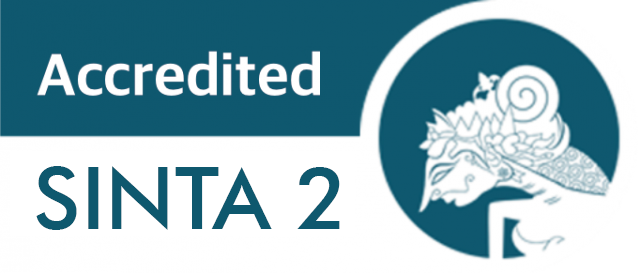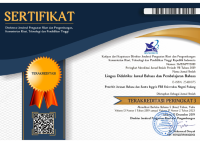Social-cultural, psychological, linguistic, and world knowledge; EFL students' voices on their speaking difficulties in the border area of Indonesia
 ), Farid Helmi Setyawan(3),
), Farid Helmi Setyawan(3), (1) Universitas Borneo Tarakan
(2) Universitas Borneo Tarakan
(3) Universitas Borneo Tarakan
 Corresponding Author
Corresponding Author
Copyright (c) 2023 Lingua Didaktika: Jurnal Bahasa dan Pembelajaran Bahasa
DOI : https://doi.org/10.24036/ld.v17i1.122490
Full Text:
 Language : en
Language : en
Abstract
This study was conducted to identify students' difficulties with English speaking. This research used a qualitative method involving six students in the fifth semester of the English department at public university in Kalimantan Utara through purposive sampling. Data collection was carried out with in-depth semi-structured interviews. This study showed that students still experienced some difficulties in speaking English. The first factor was sociocultural;1) family engagement, 2) student's environment, and 3) peer engagement. The second factor was psychological; 4) feeling afraid, and 5) shyness. The third factor was linguistic; 6) local dialect, 7) pronunciation, 8) knowledge of grammatical patterns, 9) lack of vocabulary, and 10) fillers. The fourth factor was world knowledge, 11) topical knowledge, 12. limited learning time, and 13) comprehension. This study contributed to the students' reflection on finding their appropriate learning strategies and language exposure. Besides, the teacher needed to develop professionalism to help students reduce their speaking difficulties.
Keywords
References
Al-Sobhi, B. M. S., & Preece, A. S. (2018). Teaching English Speaking Skills to the Arab Students in The Saudi School in Kuala Lumpur: Problems and Solutions. International Journal of Education & Literacy Studies, 6(1), 1–11.
Arimbi, R. P., Bay, I. W., & Malabar, F. (2022). EFL Student's Anxiety in Speaking English. Jurnal Ilmiah Multidisiplin, 1(1), 1–9.
Ariyanti. (2016). Psychological Factors Affecting EFL Students' Speaking Performance. ASIAN TEFL Journal of Language Teaching and Applied Linguistics, 1(1), 77–88.
Asrifan, A., Vargheese, K. J., Syamsu, T., & Amir, M. (2020). Esp Course Design: The Need Analysis on Tourism Department in Indonesia Vocational High Schools. Journal of Advanced English Studies, 3(2), 69–77.
Astuti., & Panjaitan, E. (2019). The Effect of Fishbowl Strategy on Students'speaking Comprehension at The Eleventh Grade of Sma Muhammadiyah 18 Sunggal in Academic Year 2019/2020. Jurnal Serunai Bahasa Inggris, 12(1), 27-34.
Astuti, E. S., & Pusparini, I. (2019). Faktor-Faktor yang Mempengaruhi Speaking Performance Mahasiswa Jurusan Pendidikan Bahasa Inggris. Jurnal Filsafat, Sains, Teknologi, dan Sosial Budaya, 25(2), 27–33.
Auamara, M. (2022). An Analysis of Fillers in Speaking Performance. International Journal of Linguistics and Communication, 2(4), 45–68.
Baalen, S. (2018). Climate Change and Violent Conflict in East Africa: Integrating Qualitative and Quantitative Research to Probe the Mechanisms. International Studies Review, 20(4), 547–575.
Erlingsson, C., & Brysiewicz, P. (2013). Orientation among Multiple Truths: An Introduction to Qualitative Research. African Journal of Emergency Medicine, 3(2), 92–99.
Fitriani, D. A., Apriliaswati, R., & Wardah. (2015). A Study on Student's English-Speaking Problems in Speaking Performance. Jurnal Pendidikan dan Pembelajaran Untan, 4(9), 1–13.
Gumartifa, A., & Syahri, I. (2021). English Speaking Anxiety in Language Learning Classroom. ELIF (English Language in Focus), 3(2), 99–108.
Hamjah, H. (2012). An Analysis of The Written Grammatical Errors Produced by Freshmen Students in English Writing. Lingua Didaktika: Jurnal Bahasa dan Pembelajaran Bahasa, 6(1), 17-25.
Hidayati, W. (2019). An Analysis of Difficulty Level in Speaking English by Eighth Class Students of Smp Unismuh Makassar. Unpublished writing, 1–100.
Hinkel, E. (2018). Teaching Speaking in Integrated-Skills Classes. IEEE Access. 3(1), 1– 6.
Indah, R. N., Rohmah, G. N., & Afifuddin, M. (2020). What I know Best: Assessing Indonesian Student Structural Knowledge through Student-Generated Topics. European Journal of Educational Research, 9(2), 629-638.
Khasanova, K., Babadjanova, G., & Isanova, V. (2020). Professional-Oriented Teaching Foreign Language at a Non-Language University and The Role of Descriptive Methods in The Lessons. Mental Enlightenment Scientific-Methodological Journal, 2020(2), 169–174.
Kurniawati, D. (2015). Studi Tentang Faktor-Faktor Penyebab Kesulitan Belajar Menyimak Bahasa Inggris Pada Mahasiswa Semester III PBI IAIN Raden Intan Lampung Tahun Pelajaran 2015/2016. English Education: Jurnal Tadris Bahasa Inggris, 8(1), 157-178.
Kusumawati, T. I. (2016). Komunikasi Verbal Dan Nonverbal. Jurnal al-Irsyad, 6(2), 1–16.
Labov, W., Ash, S., Ravindranath, M., Weldon, T., Baranowski, M., & Nagy, N. (2011). Properties of the sociolinguistic monitor 1. Journal of Sociolinguistics, 15(4), 431463.
Leong, L.-M., & Ahmadi, S. M. (2017). An Analysis of Factors Influencing Learners' English-Speaking Skill. International Journal of Research in English Education, 2(2), 4–41.
Malik, S., Qin, H., & Oteir, I. (2021). Perceived Psychological, Linguistic and SocioCultural Obstacles: An Investigation of English Communication Apprehension in EFL Learners. International Journal of Instruction, 14(4), 733–752.
Mekonnen, M. A. (2017). Effects of Family Educational Background, Dwelling and
Parenting Style on Students' Academic Achievement: The Case of Secondary Schools in Bahir Dar. Academic Journals, 12(18), 939–949.
Mustafa, E. N. E. (2015). Psychological Factors Affecting Sudanese EFL Learners' Oral Performance: A case study of Sudan University of Science and Technology. Applied Linguistics, 2(5), 1–86.
Nguyen, H. T., & Tran, N. M. (2015). Factors Affecting Students' Speaking Performance At Le Thanh Hien High School. Asian Journal of Educational Research, 3(2), 8–23.
Nijat, N., Atifnigar, H., Chandran, K., Selvan, S. L. T., & Subramonie, V. (2019). Psychological Factors that Affect English Speaking Performance among Malaysian Primary School Pupils. American International Journal of Education and Linguistics Research, 2(2), 55–68.
Nirwana, A., Mukadar, S., & Badu, T. K. (2020). The Effectiveness of Tongue Twisters Strategy to Increase the Students' Speaking Ability. Uniqbu Journal of Social Sciences (UJSS), 1(3), 80–95.
Nyoman, N., Astuti, S., Ability, S., Learning, B., & Teaching, C. (2018). The Effects of Blended Learning on Students' Speaking Ability: A Study of Utilizing Technology to Strengthen the Conventional Instruction. International Journal of Linguistics, Literature, and Culture, 4(3), 1–14.
Ossai, R., Opara, C. C., & Maduekwe, A. N. (2021). Effect of E-dictionary Strategy for Vocabulary Acquisition on the listening and Speaking Skills. Journal of Research in Humanities and Social Science, 9(7), 01–14.
Panjaitan, K., Sihombing, E., Pasaribu, C. C., Anita, C., & Siregar, E. (2022). Review of Multidisciplinary Education, Culture and Pedagogy (Romeo, International Journal of Linguistics, Literature, and Culture, 1(2), 69–74.
Pramuditha, P.A. (2015). Students’ difficulties in speaking English and their strategies to overcome the difficulties: A Descriptive Qualitative Study of 12th Graders of Software Engineering Programme at a Vocational School in Bandung. S1 thesis, Universitas Pendidikan Indonesia.
Prastyawan, W., Ashari, A., & Ismiatun, F. (2021). Students' Perception of English One for Twenty (Eot) Program Towards Their Self Confidence in Speaking skill, 2(2), 1–9.
Putra, J. U. (2018). An Analysis of Students' Anxiety in English Speaking Classroom at The Third Semester Students of English Department in Makassar, 1(1), 1–87.
Quỳnh, N. T. N. (2021). Students' Perception of Speaking Practice in Step Up English Club at Ho Chi Minh City University of Technology and Education. Indonesian Journal of Educational Research, 1(3), 123–134.
Rahmawanti, M. R., Larasati, T. M., & Rahayu, N. (2021). Toward Learners' Spoken Grammar Understanding Students' Perception on The Use of English-Subtitled Movies Toward Learners' Spoken Grammar. Journal of Sociolinguistics, 3(5), 39–49.
Ramli, Setyawan, F. H., & Rampeng. (2021). The Threat of Lingua Globalization towards Vernaculars in South Sulawesi. Jurnal Etnografi Indonesia, 6(2), 230–240.
Shahzadi, A., Asghar, A., & Javed, S. (2014). Effectiveness of Corpus in Teaching English Synonyms. Corporum: Journal of Corpus Linguistics-CJCL, 2(1), 51–65.
Spolsky, B. and Hult, F. M. (2008). The History and Development of Educational Linguistics. The Handbook of Educational Linguistics, 2(1), 10-24.
Suleimenova, Z. (2013). Speaking Anxiety in a Foreign Language Classroom in Kazakhstan. Procedia - Social and Behavioral Sciences, 93, 1860–1868.
Tambunsaribu, G., & Galingging, Y. (2021). Masalah yang Dihadapi Pelajar Bahasa Inggris dalam Memahami Pelajaran Bahasa Inggris. Jurnal Bahasa, Sastra, Dan Budaya, 3(2), 1–12.
Tawfiq, H. H. (2020). Investigating the Sociocultural Factors that Affect Learning a Second Language (on the Example of English). International Journal of Linguistics, 12(4), 81–102.
Thornbury, S. (2013). Resisting Coursebooks. in Critical Perspectives on Language Teaching Materials. Palgrave Macmillan, London.1 (4) 204–223.
Tuan, N. H., & Mai, T. N. (2015). Factors Affecting Students' Speaking Performance at Le Thanh Hien High School. Asian Journal of Educational Research, 3(7), 8-23.
Qutob, M. M. (2018). The Relationship between EFL Learners' Satisfaction within the Classroom Environment and Their Speaking Skills. English Language Teaching, 11(7), 116–124.
Widodo, U. (2020). Contextual Teaching and Learning: An Alternative Method to Teach Speaking. SELL Journal, 5(2), 115–130.
 Article Metrics
Article Metrics
 Abstract Views : 397 times
Abstract Views : 397 times
 PDF Downloaded : 155 times
PDF Downloaded : 155 times
Refbacks
- There are currently no refbacks.
Copyright (c) 2023 Lingua Didaktika: Jurnal Bahasa dan Pembelajaran Bahasa

This work is licensed under a Creative Commons Attribution-NonCommercial 4.0 International License.









